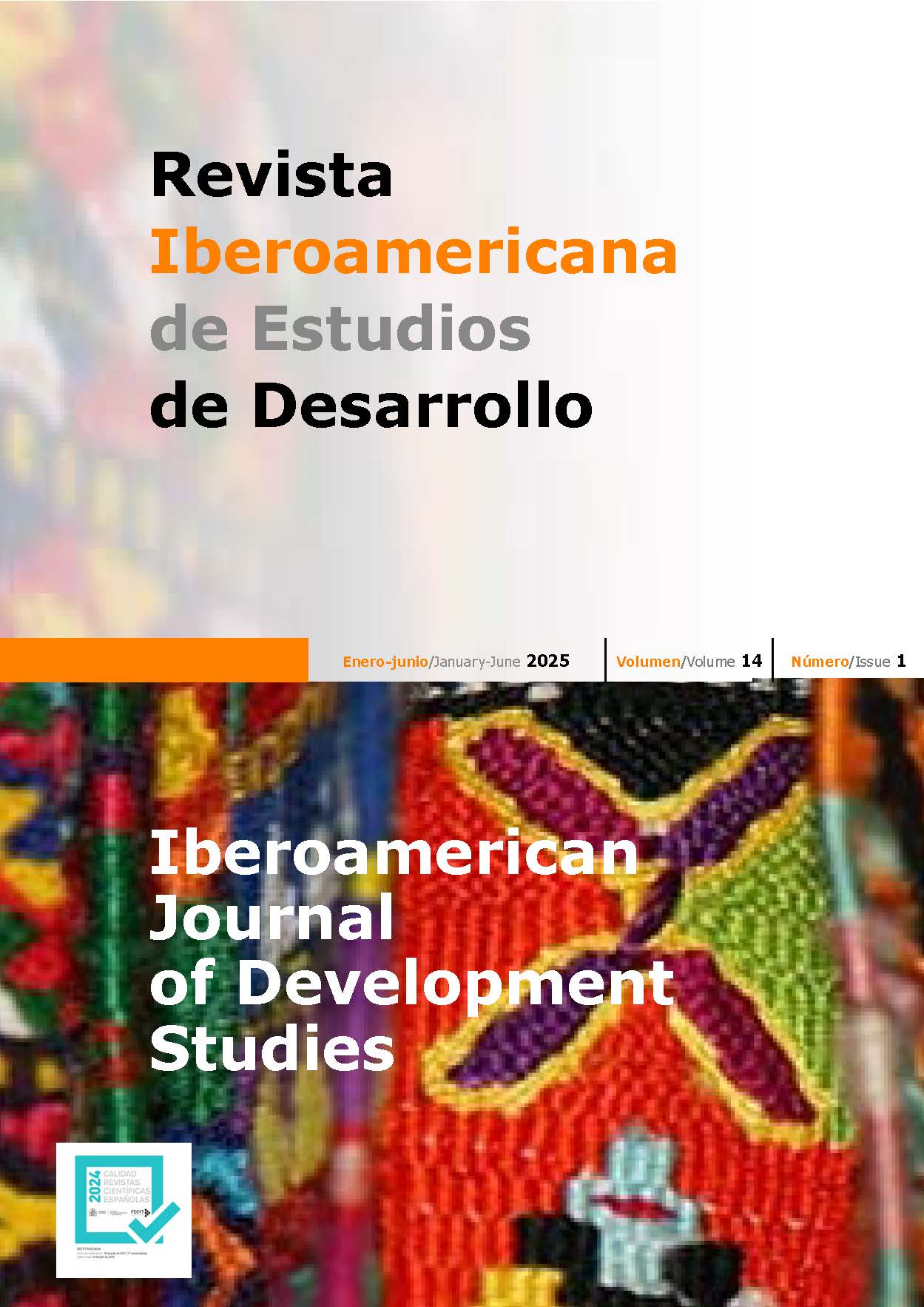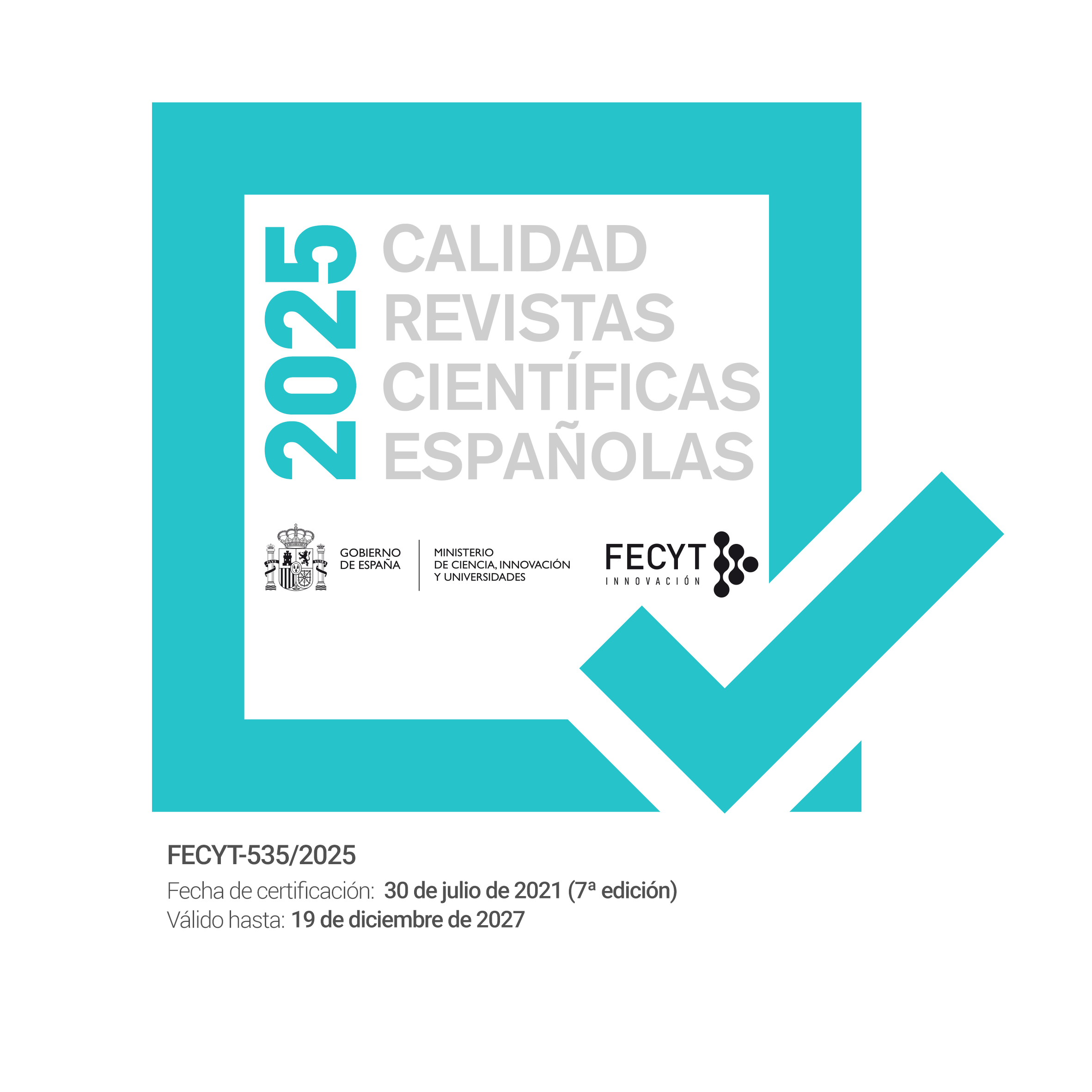Bringing local perspective into peacebuilding. The case of Sierra Leone Truth and Reconciliation Commission
DOI:
https://doi.org/10.26754/ojs_ried/ijds.10713Keywords:
peacebuilding, conflicts, human rights, transitional justice, Sierra LeonaAbstract
After going through an eleven yearlong violent civil war, Sierra Leone started its peacebuilding process in 2002. This operation has been considered a successful one. In the paper, I focus on one of its instruments: the Sierra Leone Truth and Reconciliation Commission (SLTRC). This body promoted truth telling to establish accountability and to know the needs in society. The aim was to determine to which extent it incorporated the local perspective. To this end, different ways of incorporating the local perspective have been used. At the same time, I also looked at its gender approach, where both successful and shortcomings were found. I conclude that neither of the perspective was well consolidated.
Downloads
References
AJETUNMOBI AO (2011). A study of the Mechanisms of Effects of Sierra Leone’s Truth and Reconciliation Commission on Democratic Governance. Doctoral Thesis. Ann Arbor.
AMSTRONG A, NTEGEYE G (2006). The devil is in the details: the challenges of transitional justice in recent African peace agreements. African Human Rights Law Journal 6(1):1-25.
ANDERS G (2015). Transitional Justice, States of Emergency and Business as Usual in Sierra Leone. In: Anders G, Zenker O (eds.). Transition and Justice: Negotiating the Terms of New Beginning in Africa. Wiley Blackwell, Sussex, pp. 135-152. DOI: https://doi.org/10.1002/9781118944745.ch7
ANDREWS P (2016). Justice, Reconciliation and the Masculinist Way: What Role for Women in Truth and Reconciliation Commissions? New York Law School Review 60:199-224.
BENAVIDES F, MATEOS MARTÍN Ó, CAMPS FEBRER B (2018). Límites y desafíos de la Justicia Transicional en las nuevas transiciones: un análisis crítico a partir de los casos de Sierra Leona, Marruecos y Colombia. Relaciones Internacionales 38:121-145. DOI: https://doi.org/10.15366/relacionesinternacionales2018.38.006
BØÅS M, TOM P (2016). International Interventions and Local Agency in Peacebuilding in Sierra Leone. In: Richmond OP, Pogodda S (eds.). Post-liberal Peace Transitions. Between Peace Formation and State Formation. Edinburgh University Press, Edinburgh, pp. 143-159. DOI: https://doi.org/10.1515/9781474402187-010
BORAINE A (2009) South Africa’s Truth and Reconciliation Commission from a Global Perpective. In: Sriram CL, Pillay S (eds.). Peace versus Justice? The Dilemma of Transitional Justice in Africa. University of KwaZulu-Natal Press, Durban, pp. 137-152.
BRIGG M, GEORGE N (2020). Emplacing the spatial turn in peace and conflict studies. Cooperation and Conflict 55(4):409-420. DOI: https://doi.org/10.1177/0010836720954488
BULDUK C, ONYESOH, J, ACHAKPA M (2022). Exploring gendered understanding of peace in Delta State. In: Prügl E, Kunz R, Achakpa M, Myrttinen H, Onyesoh J, Rahmawati A, Rigual C, Udasmoro W (eds.). Gender in Peacebuilding. Brill | Nijhoff, Leiden y Boston, pp. 45-64. DOI: https://doi.org/10.1163/9789004498471_004
CAHILL-RIPLEY A (2014). Foregrounding socio-economic rights in transitional justice: realising justice for violations of economic and social rights. Netherlands Quarterly of Human Rights 32(2):183-213. DOI: https://doi.org/10.1177/016934411403200205
CULLEN LC (2020). Female Combatants and the Post-Conflict Process in Sierra Leone. Journal of International Women’s Studies 21(2):114-125.
DOUGHERTY BK (2004). Searching for answers: Sierra Leone’s Truth & Reconciliation Commission. African Studies Quarterly 8(1):39-56.
EKIYOR T (2009). Reflecting on the Sierra Leone Truth and Reconstruction Commission. A peacebuilding perspective. In: Sriram CL, Pillay S (eds.). Peace versus Justice? The Dilemma of Transitional Justice in Africa. University of KwaZulu-Natal Press, Durban, pp. 153-170.
FRIEDMAN R (2015). Restorative Justice in Sierra Leone: Promises and Limitation. In: Ainley K, Friedman R, Mahony C (eds.). Evaluating Transitional Justice. Accountability and Peacebuilding in Post-Conflict Sierra Leone. Palgrave Macmilllan, New York, pp. 55-76. DOI: https://doi.org/10.1057/9781137468222_4
FRIEDMAN R (2017). Underdevelopment, Peace-Building and Marginalization. The Establishment of a Restorative Agenda in Sierra Leone. In: Friedman R (ed.). Competing Memories. Truth and Reconciliation in Sierra Leone and Peru. Cambridge University Press, Cambridge, pp. 74-105. DOI: https://doi.org/10.1017/9781316874950.004
GEORGE N (2018). Liberal-local peacebuilding in Solomon Islands and Bougainville: advancing a gender-just peace? International Affairs 94(6):1329-1348. DOI: https://doi.org/10.1093/ia/iiy193
GRAYBILL LS (2011). Partial Justice and Reconciliation for Sierra Leone women but reparations and reform remain elusive. Research in Social Movements, Conflicts and Change 32:101-120. DOI: https://doi.org/10.1108/S0163-786X(2011)0000032008
HEATHERSHAW J (2013). Towards better theories of peacebuilding: beyond the liberal peace debate. Peacebuilding 1(2):275-282. DOI: https://doi.org/10.1080/21647259.2013.783260
HIRSCH JL (2009). Peace and Justice. Mozambique and Sierra Leone compared. In: Sriram CL, Pillay S (eds.). Peace versus Justice? The Dilemma of Transitional Justice in Africa. University of KwaZulu-Natal Press, Durban, pp. 202-219.
HOLLIS BJ (2015). Evaluating the Legacy of the Special Court for Sierra Leone. In: Ainley K, Friedman R, Mahony C (eds.). Evaluating Transitional Justice. Accountability and Peacebuilding in Post-Conflict Sierra Leone. Palgrave Macmillan, Hampshire, pp. 19-34. DOI: https://doi.org/10.1057/9781137468222_2
INTERNATIONAL CENTRE FOR TRANSITIONAL JUSTICE (2004). The Special Court for Sierra Leone: the first eighteen months. Case study series, March 2004.
JACKSON P, ALBRECHT P (2018). Power, politics and hybridity. In: Wallis J, Kent L, Forsyth M, Dinnen S, Bose S (eds.). Hybridity on the ground in peacebuilding and development: critical conversation. The Australian National University Press, Australia, pp. 37-49. DOI: https://doi.org/10.22459/HGPD.03.2018.02
JOHNSON K, HUTCHISON, ML (2012). Hybridity, political order and legitimacy: examples from Nigeria. Journal of Peacebuilding and Development 7(2):37-52. DOI: https://doi.org/10.1080/15423166.2012.743811
KARBO T (2012). Localising Peacebuilding in Sierra Leone: What does it mean? ACCORD 3:1-13.
KELSALL T (2005). Truth, Lies, Ritual: Preliminary, Reflections in the Truth and Reconciliation Commission in Sierra Leone. Human Rights Quarterly 27(2):361-391. DOI: https://doi.org/10.1353/hrq.2005.0020
KENNEDY R (2018). Reparative transnationalism: the friction and fiction of remembering in Sierra Leone. Memory Studies 11(3):342-354. DOI: https://doi.org/10.1177/1750698018771867
KORMOH JL (2016). Chieftaincy Reform and Liberal Peace-Building in Sierra Leone. In: Mustapha M, Bangura J (eds.). Democratization and human security in postwar Sierra Leone. Palgrave Macmillan, Hampshire, pp. 37-58. DOI: https://doi.org/10.1057/9781137486745_3
KOROMA P (2012). Decentralisation and peacebuilding in Sierra Leone. ACCORD 23:30-33.
LANGER J (2017). Are Truth Commissions just hot-air ballons? A reality check on the Impact of Truth Commission Recommendations. Desafíos 29(1):177-210. DOI: https://doi.org/10.12804/revistas.urosario.edu.co/desafios/a.4866
LEONARDSSON H, RUDD G (2015). The «local turn» in peacebuilding: a literature review of effective and emancipatory local peacebuilding. Third World Quarterly 36(5):825-839. DOI: https://doi.org/10.1080/01436597.2015.1029905
LOMÉ PEACE AGREEMENT, July 7, 1999.
MACGINTY R (2010). Hybrid peace: the interaction between top-down and bottom-up peace. Security Dialogue 41(4):391-412. DOI: https://doi.org/10.1177/0967010610374312
MACGINTY R, RICHMOND OP (2013). The local turn in peace building: a critical agenda for peace. Third World Quarterly 34(5):763-783. DOI: https://doi.org/10.1080/01436597.2013.800750
MACKENZIE M, SESAY M (2012). No Amnesty from/for the International: The Production and Promotion of TRCs as an International Norm in Sierra Leone. International Studies Perspectives 13:146-163. DOI: https://doi.org/10.1111/j.1528-3585.2012.00461.x
MARTIN LS (2021). (En)gendering post-conflict agency: women’s experiences of the «local» in Sierra Leone. Cooperation and Conflict 56(4):454-471. DOI: https://doi.org/10.1177/00108367211000798
MATEOS Ó (2012). La construcción de paz posbélica. Análisis de los debates críticos a través del caso de Sierra Leona. Doctoral dissertation, Universitat Autònoma de Barcelona.
MCNAMEE T (2021). Such a long journey: peacebuilding after genocide in Rwanda. In: McNamee T, Muyangwa M (eds.). The State of Peacebuilding in Africa: Lessons Learned for Policymakers and Practitioners. Palgrave Macmillan, Cham, pp. 379-395. DOI: https://doi.org/10.1007/978-3-030-46636-7_21
MCQUEEN A (2019). Falling Through the Gap: The Culpability of Child Soldiers Under International Criminal Law. Notre Dame Law Review Online 94(2):100-127.
MENZEL A (2020). The pressures of getting it right: expertise and victim’s voices in the work of the Sierra Leone Truth and Reconciliation Commission (TRC). International Journal of Transitional Justice 14:300-319. DOI: https://doi.org/10.1093/ijtj/ijaa011
MILLAR G (2011). Local Evaluations of Justice through Truth-Telling in Sierra Leone: Postwar Needs and Transitional Justice. Human Rights Review 12:515-535. DOI: https://doi.org/10.1007/s12142-011-0195-x
MILLAR G (2013). Expectations and Experiences of Peacebuilding in Sierra Leone: Parallel Peacebuilding Processes and Compound Friction. International Peacekeeping 20(2):189-203. DOI: https://doi.org/10.1080/13533312.2013.791564
MILLAR G (2014). Disaggregating hybridity: why hybrid institutions do not produce predictable experiences of peace. Journal of Peace Research 31(4):501-514. DOI: https://doi.org/10.1177/0022343313519465
MOGHALU KC (2009). Prosecute or Pardon? Between Truth Commissions and War Crimes Trials. In: Sriram CL, Pillay S (eds.). Peace versus Justice? The Dilemma of Transitional Justice in Africa. University of KwaZulu-Natal Press, Durban, pp. 69-95.
NEWMAN E, PARIS R, RICHMOND OP (2009). Introduction. In: Newman E, Paris R, Richmond OP (eds.). New Perspectives on Liberal Peacebuilding. United Nations University, New York, pp. 3-25.
PAFFENHOLZ T (2015). Unpacking the local turn in peacebuilding: a critical assessment towards an agenda for future research. Third World Quarterly 36(5):857-874. DOI: https://doi.org/10.1080/01436597.2015.1029908
PARK ASJ (2006). Other Inhumane Acts: Forced Mariage, Girl Soldiers and the Special Court for Sierra Leone. Social and Legal Studies 15(3):315-337. DOI: https://doi.org/10.1177/0964663906066611
PARMAR S (2010). Realizing economic justice for children: the role of Transitional Justice in Post-Conflict Societies. In: Parmar S, Roseman MJ, Siegrist S, Jowa T (eds.). Children and Transitional Justice. Truth-telling, Accountability and Reconciliation. Harvard University Press, Cambridge, pp. 365-401.
PEMUNTA NY (2012). Neoliberal peace and the development deficit in post-conflict Sierra Leone. International Journal of Development Issues 11(3):192-207. DOI: https://doi.org/10.1108/14468951211262242
PHILIPSEN L (2022). Three locals of peace: a typology of local capacities for peace. Third World Quarterly 43(8):1932-1949. DOI: https://doi.org/10.1080/01436597.2022.2077720
POPPLEWELL R (2019). Civil society, hybridity and peacebuilding in Burundi; questioning authenticity. Third World Quarterly 40(1):129-146. DOI: https://doi.org/10.1080/01436597.2018.1432347
RANDAZZO E (2016). The paradoxes of the «everyday»: scrutinising the local turn in peace building. Third World Quarterly 37(8):1351-1370. DOI: https://doi.org/10.1080/01436597.2015.1120154
RICHMOND OP (2022). What is an emancipatory peace? Journal of International Political Theory 18(2):124-147. DOI: https://doi.org/10.1177/17550882211036560
RODRIGUEZ IGLESIAS AI, ROSEN N (2022). Local participation at stake: between emancipatory goals and co-option strategies. the case of territorially focused development programs in Colombia. Colombia Internacional 109:89-114. DOI: https://doi.org/10.7440/colombiaint109.2022.04
SABARATNAM M (2013). Avatars of eurocentrism in the critique of the liberal peace. Security Dialogue 44(3):259-278. DOI: https://doi.org/10.1177/0967010613485870
SARKIN J, ACKERMAN S (2019). Understanding the extent to which truth commissions are gender sensitive and promote women’s issues: comparing and contrasting these truth commission roles in South Africa, Guatemala, Peru, Sierra Leone and Liberia. Georgetown Journal of International Law 50:463-516.
SCHABAS WA (2006). The Sierra Leone Truth and Reconciliation Commission. In: Roht-Arriaza N, Meriezcurrena J (eds.). Transitional Justice in the Twenty-First Century. Beyond Truth versus Justice. Cambridge University Press, Cambridge, pp. 21-42. DOI: https://doi.org/10.1017/CBO9780511617911.003
SHAW R (2005). Rethinking truth and reconciliation commissions. Lessons from Sierra Leone. United States Peace Institute, Special Report 130, February 2005.
SHAW R (2007). Memory Frictions: Localizing the Truth and Reconciliation Commission in Sierra Leone. The International Journal of Transitional Justice 1:183-207. DOI: https://doi.org/10.1093/ijtj/ijm008
SIERRA LEONE TRUTH AND RECONCILIATION COMMISSION (2004). The TRC and the Special Court for Sierra Leone. Final Report 3(6):363-430.
SIERRA LEONE TRUTH AND RECONCILIATION COMMISSION STATUTE. January 2000.
SOOKA YL (2009). The Politics of Transitional Justice. In: Sriram CL, Pillay S (eds.). Peace versus Justice? The Dilemma of Transitional Justice in Africa. University of KwaZulu-Natal Press, Durban, pp. 21-43.
SOURIS RN (2017). Child soldiering on trial: an interdisciplinary analysis of responsibility in the Lord’s Resistance Army. International Journal of Law in Context 13(3):316-335. DOI: https://doi.org/10.1017/S1744552317000052
SRIRAM CL (2009). Transitional Justice and Peacebuilding. In: Sriram CL, Pillay S (eds.). Peace versus Justice? The Dilemma of Transitional Justice in Africa. University of KwaZulu-Natal Press, Durban, pp. 1-17.
SVÄRD P (2010). The international community and post-war reconciliation in Africa: a case study of the Sierra Leone Truth and Reconciliation Commission. African Journal of Conflict Resolution 10(1):35-62. DOI: https://doi.org/10.4314/ajcr.v10i1.59306
TEJAN-COLE A (2009). Sierra Leone’s «not-so» Special Court. In: Sriram CL, Pillay S (eds.). Peace versus Justice? The Dilemma of Transitional Justice in Africa. University of KwaZulu-Natal Press, Durban, pp. 223-247.
TRANTIDIS A (2022). Fallacies of democratic state-building. International Studies Review 24(4):1-20. DOI: https://doi.org/10.1093/isr/viac053
UN (UNITED NATIONS) (1992). An Agenda for Peace. Preventive Diplomacy, Peacemaking and Peacekeeping. Report of the Secretary-General Pursuant to the Statement Adopted by the Summit Meeting of the Security Council on 21 January 1992. United Nations Library.
UNOBE EC (2022). Justice Mirage? Sierra Leone’s Truth and Reconciliation Commission and Local Women’s Experiences. Peace and Conflict: Journal of Peace Psychology 28(4):429-436. DOI: https://doi.org/10.1037/pac0000600
VALJI N (2012). A window of opportunity: making transitional justice work for women. UN Women, 2nd ed.
VAN LEEUWEN M, NINDORERA J, NZWEVE J-LK, CORBIJN C (2020). The «local turn» and notions of conflict and peacebuilding – reflections on local peace committees in Burundi and Eastern Dr. Congo. Peacebuilding 8(3):279-299. DOI: https://doi.org/10.1080/21647259.2019.1633760
Downloads
Published
Issue
Section
License
Copyright (c) 2025 Irene Jiménez-Zumalde

This work is licensed under a Creative Commons Attribution-NonCommercial-NoDerivatives 4.0 International License.





